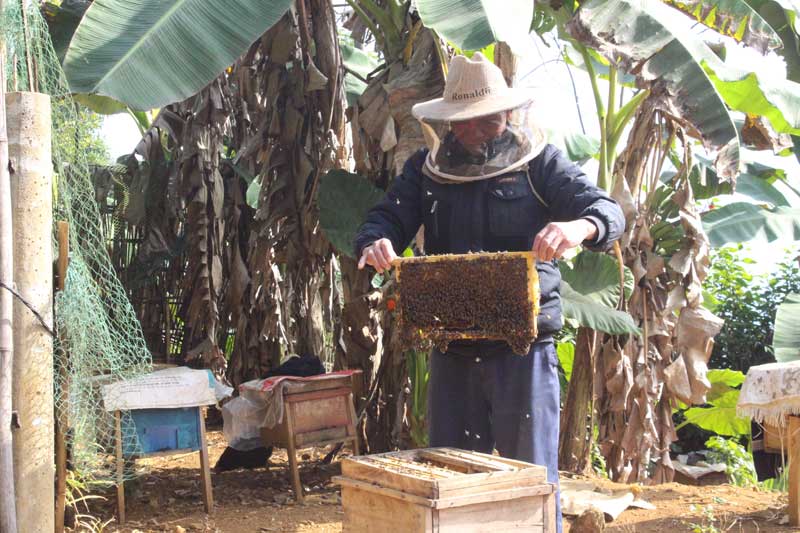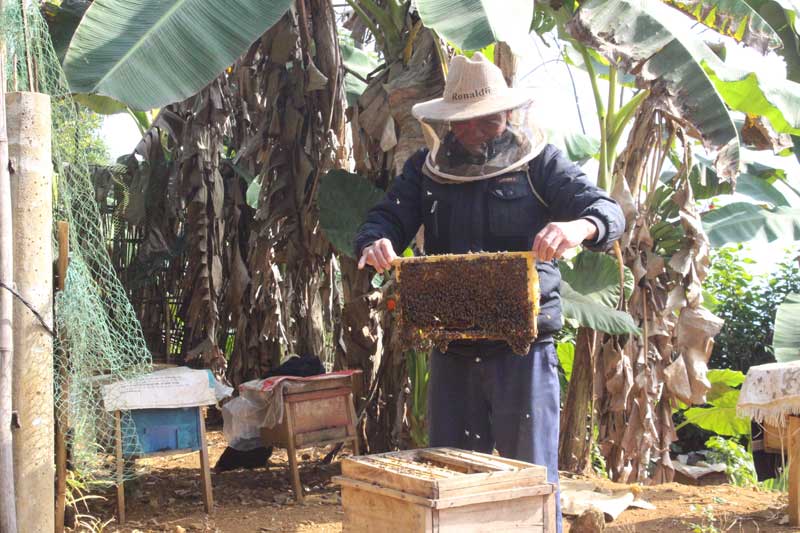
(HBO)- Utilizing the potential of the rich and diverse forest resources, a lot of households in Mien Doi commune (Lac Son) have developed beekeeping for honey. The direction is in accordance with the actual local conditions. According to the statistics, there are more than 120 households with nearly 800 flocks of bees in the commune. The quality of honey is ensured, the output has been gradually increasing, thereby the brand "Mien Doi Honey" is step by step creating, contributing to the promotion of the local economic development.
Mr. Bui Van Dau from Than Duoi village
excitedly said: "The winter this year comes later than every year, it is
still warm and sunny at the end of December. Therefore, some households raising
bees can provide the market with honey. This is the first year my family has
started to develop bee keeping model for honey, so we are still lack of
experiences and technology. However, we received the support from the other
beekeeping households in the hamlet and we found it effective. We collected 60
liters of honey, getting the profit of over 10 million VND. It is only a
temporary job but the income is fine "

Honey beekeeping provides a significant
income for the households in Muc Doi commune (Lac Son).
Mien Doi fully converges elements to develop beekeeping
for honey such as climate, soil and rich and diverse forest resources. Except
for winter, during the three remaining seasons of the year bees can give honey
to help households with income. In particular, the peak is from March to July
of the calendar, the time when flowers are blooming. Therefore, from 2010 up to
now, honey beekeeping has become a movement attracting many households in the
commune to participate. Currently, some households have developed beekeeping
models with the number of 30 - 40 flocks. The final prices range from 140,000
to 200,000 VND a liter depending on the time, bringing about 40-60 million VND
a year. The typical households in the beekeeping movement in Mien Doi are M.r
Bui Van Luong (Bang village), Mr. Bui Van Rieng (Than Tren Village), Mr. Bui
Van Manh (Voi Thuong village) and so on.
Currently, all the products are consumed in
the free market and sold in the neighboring markets. They have not yet been
able to be linked with the output consuming enterprises and companies. Besides,
some beekeepers also apply the manual techniques, not applying scientific and
technological advances to the beekeeping process to improve the productivity
and quality of the product.
According to data from the Hoa Binh Provincial Party Committee, the industrial production index for the first six months of 2025 is estimated to have increased by 20% compared to the same period last year. This marks the highest year-on-year growth rate for this period since 2020.
In the first six months of 2025, Hoa Binh province’s export turnover was estimated at 1.145 billion USD, marking an 18.11% increase compared to the same period in 2024. Import turnover was estimated at $ 804 million, a 17.15% increase, which helped the province maintain a positive trade balance.
The lives of the ethnic minority farmers in Tan Lac district have gradually improved thanks to the new directions in agricultural production. This is a testament to the collective strength fostered through the professional associations and groups implemented by various levels of the district’s Farmers’ Union.
With the motto the "product quality comes first,” after nearly one year of establishment and operation, Muong village’s Clean Food Agricultural and Commercial Cooperative, located in Cau Hamlet, Hung Son Commune (Kim Boi district), has launched reputable, high-quality agricultural products to the market that are well-received by consumers. The products such as Muong village’s pork sausage, salt-cured chicken, and salt-cured pork hocks have gradually carved out a place in the market and they are on the path to obtaining the OCOP certification.
In the past, the phrase "bumper harvest, rock-bottom prices" was a familiar refrain for Vietnamese farmers engaged in fragmented, small-scale agriculture. But today, a new spirit is emerging across rural areas of Hoa Binh province - one of collaboration, organisation, and collective economic models that provide a stable foundation for production.
Maintaining growing area codes and packing facility codes in accordance with regulations is a mandatory requirement for agricultural products to be eligible for export. Recently, the Department of Agriculture and Environment of Hoa Binh province has intensified technical supervision of designated farming areas and packing facilities to safeguard the "green passport" that enables its products to access international markets.



